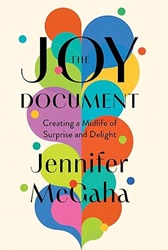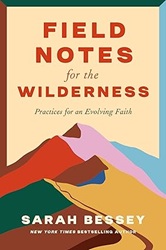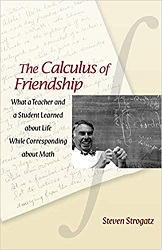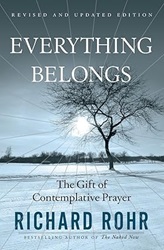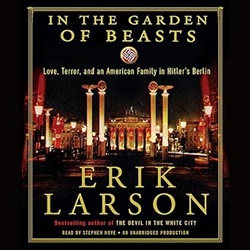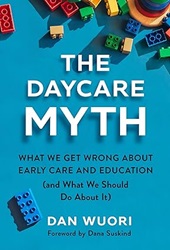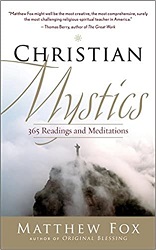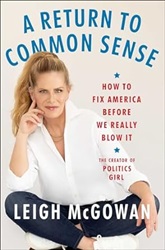 A Return to Common Sense
A Return to Common Sense
How to Fix America Before We Really Blow It
by Leigh McGowan
One Signal Publishers (Atria), 2024. 294 pages.
Review written December 11, 2024, from my own copy, purchased via Amazon.com
Starred Review
Well, I wish I’d read and reviewed this book before the election, because I feel pretty confident that electing Donald Trump was “really blowing it” as mentioned in the subtitle.
However, the principles Leigh McGowan puts forth here still apply, and I hope we can use them as a beacon to work toward better times.
Leigh McGowan is the creator of the PoliticsGirl podcast – and she’s skilled at breaking down political ideas into clear language. She actually grew up in Canada, but has all the more faith in what America stands for because she chose it for herself.
The author was inspired to write this book by Thomas Paine’s Common Sense, written right before the American Revolution. Her writing is rooted in history, but also a deep passion for understanding how government works and how it should work. This paragraph from her Introduction will give you an idea of where she’s going:
Once again, America finds itself at a tipping point where it could go one of two ways. Once again, our leaders need the inspiration and courage to pick the harder, but more rewarding path. And once again, it will come down to the will of the people to determine our fate. If we choose to continue down this path of division and inequality, with hatred and misinformation impeding our progress, we’ll end up right back where we started, under some form of top-down rule. However, if we choose to address our flawed but inspired democracy now, I believe we can rebuild this nation on a stronger foundation than we began on. It’s my belief, as Paine argued all those years ago, that there’s only one right path, and if we fail to choose it, we’ll lose the opportunity to choose again. This time the choice isn’t between subjugation or independence, but democracy and plutocracy. We either continue to favor the wealthy and influential, while we strip citizens of their rights and shore up minority rule, or we get serious about living up to the ideals we’ve sold to the world.
She roots her book in history, including “America 101” sidebars about how our government works. And then she bases the rest of the book on “The Six American Principles.”
So, how do we build this better, stronger nation? What are the fundamental building blocks we can all agree make America, America? What do we, the citizens of this nation, believe are the bedrocks of the United States? Drawing on our founding documents, and important moments in our country’s history, I propose the Six American Principles. Six things that we, the people, no matter our politics, persuasion, or background, can agree on. Six ideals we can use as guideposts to not only find our way out of the mess we’re currently in, but to set a course for a future of which we can actually be proud. If we start here, we start strong.
Here are the Six American Principles she proposes:
1. America is a land of freedom.
2. Everyone should have the opportunity to rise.
3. Every citizen should have a vote, and that vote should count.
4. Representatives should represent the people who voted for them.
5. The law applies to all of us.
6. Government should be a force for good.
Of course, there’s lots to say about each of these principles, and that’s what takes up the bulk of the book. What does “freedom” mean? And who actually gets it? There are a lot of history sidebars in the section that talks about that. What does it mean to have the opportunity to rise? And what does it mean for your vote to count? And how do legislators represent people? There’s lots of background here about how our representatives are chosen and how elections work – and ideas for improving that.
The principle I resonated most with is “Government should be a force for good.” I guess that’s because, as a librarian, I work for local government. And I very much believe that the lives of everyone in the county are better because of that work. Here’s how Leigh McGowan introduces that section:
It’s easy to criticize government, and candidly, there’s plenty that deserves criticism. However, government is something we cannot live without. There is so much the government does that we don’t even consider. From local governments sending workers to remove that tree that fell across your street to Homeland Security stopping a potential terrorist attack. From weekly garbage pickup, to workers in our national parks, to government scientists approving the quality of our vaccines and baby food. If you call the police, that’s the government. If you need the fire department, it’s paid for by the government. If your state has a natural disaster, it will be the government who foots the bill to clean it up. Do you use public school? Government. Is mail delivered to your home? Government. Do your streetlights come on, and traffic lights work? That’s the government. Government plays such a huge and essential role in our modern society that we couldn’t live without it, yet we spend so much time complaining about it when we could be engaging with it to make it better.
Ronald Reagan inflicted a great wound on the country when he said, “The nine most terrifying words in the English language are: I’m from the Government, and I’m here to help.” As president of the United States, Reagan used his authority as head of the government to undermine how essential government really is. The government should help its people, and if you don’t believe that, then what are you doing in government?
And she goes on to suggest ways the government can be a greater force for good in our lives.
Obviously, with me, Leigh McGowan is preaching to the choir. I agree with almost all of her views, and I appreciate her passion. But I also appreciate her no-nonsense, plain-spoken way of explaining what can be murky. She’s done her research, and to me, she makes politics and government easier to understand.
Now, it’s easy to feel discouraged after the 2024 presidential election. But I still appreciate the way she encourages us all to do our part and make this country a better place:
What I’ve noticed while positioning myself in this “warrior for democracy” space is that I’ve struck a nerve, not just with the people who tell me I’m an idiot, or a communist, or hate it when women speak, but with important and powerful people. People with real influence and the ability to make change. People who, despite what we see on TV, in formal tweets, or what their general by-the-book demeanor may suggest, really do care about what’s happening in this country and are passionate about fixing it. I say this because I want you to know if you speak up, if you vote, if you organize, that you will be heard. That there are people who recognize you are unhappy, and they are out here attempting to work within the system to fix it. Please know you have not been abandoned, and the louder and clearer we are about what we want and are willing to fight for, the more confidence and courage those people will have to make the changes this country truly needs.
Thank you, PoliticsGirl, for making politics and government and history so much clearer. Thank you for this vision of a government that is a force for good. And thank you for encouraging all of us to work to make that vision a reality.
SimonandSchuster.com
Buy from Amazon.com
Find this review on Sonderbooks at: www.sonderbooks.com/Nonfiction/return_to_common_sense.html
Disclosure: I am an Amazon Affiliate, and will earn a small percentage if you order a book on Amazon after clicking through from my site.
Disclaimer: I am a professional librarian, but the views expressed are solely my own, and in no way represent the official views of my employer or of any committee or group of which I am part.
What did you think of this book?
